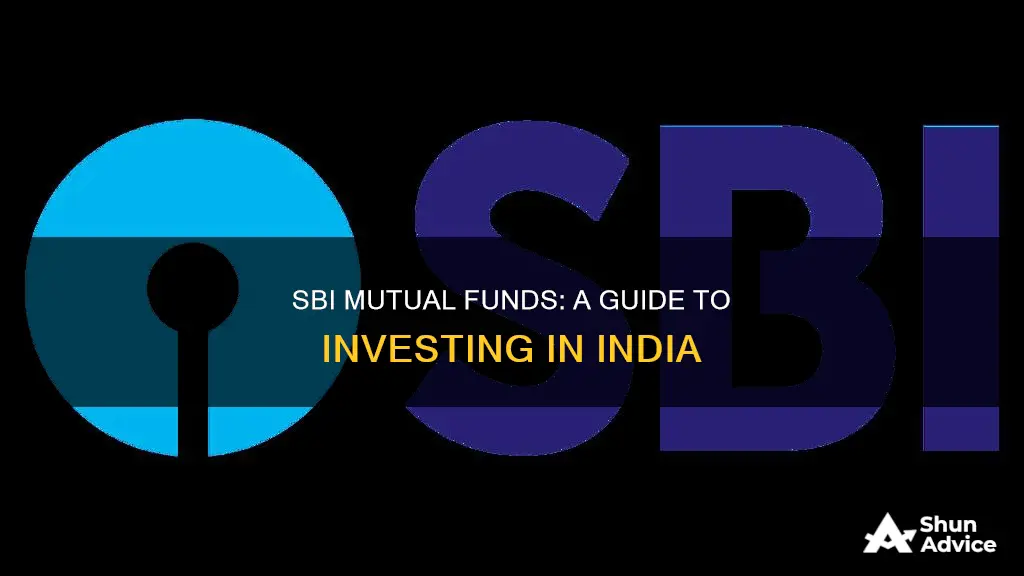
SBI Mutual Fund is one of India's largest and oldest mutual funds, established in 1987 and incorporated in 1992. It is a joint venture between the State Bank of India and the French asset management company Amundi. SBI Mutual Fund offers a wide range of investment options, including equity, debt, and hybrid funds, catering to diverse risk capacities, investment tenors, and liquidity options. The fund has consistently performed well, managing assets worth over Rs. 9 lakh crores as of March 2024.
Investing in SBI Mutual Funds can be done through various methods, including online platforms, offline application forms, or through distributors. The official website provides a comprehensive guide to the different schemes available, allowing investors to choose based on their goals and risk appetite. SBI Mutual Fund also offers a range of tools and resources to help investors make informed decisions, including transaction calculators, investment starter kits, and video tutorials.

Money Market investments
Money market funds are short-term debt funds that invest in various money market instruments, aiming to offer good returns over a period of up to one year while maintaining high liquidity. The average maturity of these funds is one year, making them highly liquid. Money market instruments are sold at a discount to their face value, and the amount paid to the investor at maturity is predetermined.
Money market funds are considered extremely low-risk investments. They are ideal for investors with a lower risk tolerance who want good returns while maintaining liquidity. These funds are regulated by the Reserve Bank of India (RBI), which controls the Indian money market.
- Liquidity: Due to their short maturity duration, money market funds are highly liquid. They are also regarded as close substitutes for money because they offer fixed income in a short period.
- Ensured Returns: Since money market instruments are sold at a discount, the returns are predetermined, helping individuals select instruments that meet their financial goals.
- Easy Fund Resources: Money markets allow investors to withdraw funds on short notice. Institutions often prefer borrowing funds from the market instead of banks due to simpler processes and lower interest rates.
- Returns: Money market funds can provide higher returns than traditional savings accounts, although the returns are not guaranteed and depend on interest rates.
When investing in money market funds, you can do so through an Asset Management Company (AMC) or a reliable platform. You will typically need to complete a registration and Know Your Customer (KYC) process.
Some popular money market funds in India include:
- Tata Money Market Fund
- Bajaj Finserv Money Market Fund
- SBI Savings Fund
- ICICI Prudential Money Market Fund
- UTI Money Market Fund
Sovereign Wealth Funds: Global Investment Strategies and Secrets
You may want to see also

Debt Funds
The SBI Magnum Gilt Fund is an example of a debt fund offered by SBI Mutual Fund, investing in government securities with varying maturities.
- Liquid Fund
- Money Market Fund
- Dynamic Bond Fund
- Corporate Bond Fund
- Banking and PSU Fund
- Gilt Fund
- Credit Risk Fund
- Floater Fund
- Overnight Fund
- Ultra-Short Duration Fund
- Low Duration Fund
- Short Duration Fund
- Medium Duration Fund
- Medium to Long Duration Fund
- Long Duration Fund
The taxation rules for debt funds in India are as follows:
- If the units of the scheme are held for up to three years, capital gains are considered short-term capital gains (STCG) and are taxed according to the applicable income tax slab.
- If the units of the scheme are held for more than three years, capital gains are considered long-term capital gains (LTCG) and are taxed at 20% with indexation benefits.
Money Market Funds: Secure, Liquid, and Profitable Investments
You may want to see also

Equity Funds
- India-focused equity funds typically invest at least 70% of their total assets in equities, and at least 75% of their stock assets in Indian companies. This ensures a strong emphasis on Indian businesses.
- When investing in equity funds, it is important to consider the risks and returns associated with the Indian market. These funds can provide high returns but also carry higher risks compared to other types of investments.
- Equity funds are suitable for investors who are comfortable with higher risk and have a long-term investment horizon. These funds are often used for goals such as retirement planning or saving for a child's education.
- SBI, one of India's largest banks, offers various equity funds through its mutual fund platform. Some examples include the SBI Long Term Equity Fund, SBI Infrastructure Fund, and SBI Consumption Opportunities Fund.
- The minimum investment amount for SBI's equity funds varies, with lump-sum investments typically starting at ₹5,000 and Systematic Investment Plans (SIPs) as low as ₹500.
- It is important to evaluate the performance of equity funds before investing. Consider factors such as annualized returns over 3-5 years, fund ratings, and the fund manager's track record.
- Diversification is key when investing in equity funds. Look for funds that invest in a wide range of sectors and companies to spread the risk and potentially enhance returns.
- Equity funds can provide a convenient way to invest in the Indian market, especially for those who may not have the time or expertise to pick individual stocks.
- Before investing, ensure you understand the fees and expenses associated with the fund, as these can impact your overall returns. Also, consider the fund's investment objective and ensure it aligns with your financial goals.
Equity Index Funds: A Beginner's Guide to Investing
You may want to see also

Tax implications
When investing in mutual funds in India with SBI, it's important to understand the tax implications to make informed decisions. Here are the key points regarding the tax implications of investing in mutual funds:
- Tax on Mutual Funds: Profits gained from investing in mutual funds are known as 'Capital Gains' and are subject to tax. It's important to understand how your returns will be taxed before investing.
- Factors Affecting Tax Liability:
- Fund Types: Taxation rules differ based on the type of mutual fund, such as Equity Mutual Funds, Debt Mutual Funds, and Hybrid Mutual Funds.
- Dividend: Dividends are a part of the profit distributed to investors by mutual fund companies.
- Capital Gains: Capital gains occur when investors sell their capital assets at a higher price than their total investment amount.
- Holding Period: The time between the purchase and sale of mutual fund units affects the tax rate. Holding investments for an extended period can result in a lower tax liability.
- Mutual Fund Returns: Mutual funds offer returns in the form of dividends and capital gains. Dividends are paid out of the company's profits, while capital gains result from the appreciation in the price of the mutual fund units. Both dividends and capital gains are taxable for investors.
- Taxation of Dividends: As per the Union Budget 2020 amendments, dividends received by investors from mutual fund schemes are added to their taxable income and taxed at their respective income tax slab rates.
- Taxation of Capital Gains: The taxation rate of capital gains depends on the holding period and the type of mutual fund. Capital gains can be categorised into short-term capital gains (less than 12 months) and long-term capital gains (12 months or longer).
- Taxation of Equity Funds: Equity funds invest primarily in equity shares of companies. Short-term capital gains on equity funds are taxed at a flat rate of 15%, while long-term capital gains up to Rs 1 lakh per year are tax-exempt. Gains exceeding this limit are taxed at 10% without indexation benefit.
- Taxation of Debt Funds: Debt funds have a higher debt exposure compared to equity exposure. Starting April 1, 2023, gains from debt funds will be added to taxable income and taxed at the slab rate, regardless of the holding period.
- Taxation of Hybrid Funds: Hybrid or balanced funds are taxed based on their equity exposure. If the equity exposure exceeds 65%, they are taxed like equity funds; otherwise, the taxation rules of debt funds apply.
- Securities Transaction Tax (STT): In addition to taxes on dividends and capital gains, there is an STT levied by the government when buying or selling mutual fund units of equity or hybrid equity-oriented funds. The STT is typically 0.001% of the transaction value.
- Tax Saving Mutual Funds: Equity-Linked Savings Schemes (ELSS) or tax-saving mutual funds offer tax benefits under Section 80C of the Income Tax Act. Investments in ELSS can provide deductions of up to Rs. 1.5 lakh, resulting in tax savings of around Rs. 46,800 per year. However, ELSS funds have a minimum lock-in period of three years.
- Wealth Tax: According to the Wealth Tax Act, mutual fund investments are exempted from wealth tax, so you don't need to pay wealth tax on your mutual fund holdings.
Mutual Funds: Investing in Renewable Energy's Future
You may want to see also

Online vs offline
Investing in SBI Mutual Funds can be done both online and offline. Offline, you can invest by filling up an investment application form. The online process is more straightforward and can be done through the SBI website or app, or through third-party platforms like Groww.
Online
If you choose to invest online, you must be an existing SBI Bank account holder, KYC-compliant, and have a Single or Either/Survivor status on your Savings Bank Account. All bank account holders must sign the Account Opening Application Form.
To invest through the SBI website or app:
- Log in to your account.
- Go to the Investment section.
- Click on "Invest in MF".
- Select a scheme for investment.
To invest through Groww:
- Log in to your Groww account. If you don't have one, you can register and create a new account.
- Upload your identification documents, such as Aadhaar, PAN, Voter ID card, Passport, Driving License, or any ID issued by the Central or State government.
- Upload proof of address.
- Determine the duration of your investment.
- Determine the risk amount (high, low, or medium).
- Select the best SBI Mutual Fund according to your criteria.
- If you wish to invest a lumpsum amount, click on "Invest One Time." Alternatively, you can start a Systematic Investment Plan (SIP) by clicking on "Start SIP."
Your SBI Mutual Fund investment will reflect in your personal Groww account within 3-4 working days.
Offline
To invest in SBI Mutual Funds offline, you will need to fill out an investment application form. This form can be found on the SBI website or at a physical SBI branch. The form will ask for personal information, such as your name, address, and bank account details. You may also need to provide documentation to support your application, such as proof of identity and address.
Once the form is completed and submitted, you will need to wait for your application to be processed and approved. This may take several days or weeks, and you may need to follow up with SBI to check the status of your application.
Investing online is generally faster and more convenient, as you can complete the entire process from the comfort of your home and avoid potential delays associated with manual form processing. Additionally, online platforms like Groww offer tools and resources to help you select the best investment options based on your criteria, making it easier to invest with confidence.
Strategies for Investing in Quantitative Hedge Funds
You may want to see also







